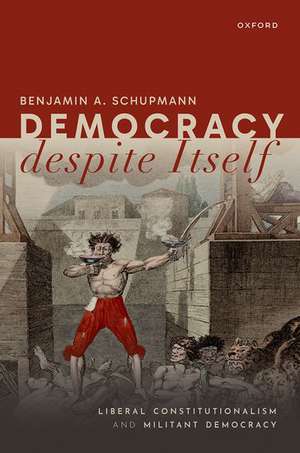Democracy despite Itself: Liberal Constitutionalism and Militant Democracy
Autor Benjamin A. Schupmannen Limba Engleză Hardback – 30 mai 2024
Preț: 540.38 lei
Preț vechi: 735.86 lei
-27% Nou
Puncte Express: 811
Preț estimativ în valută:
103.41€ • 107.35$ • 86.23£
103.41€ • 107.35$ • 86.23£
Carte disponibilă
Livrare economică 21-27 februarie
Preluare comenzi: 021 569.72.76
Specificații
ISBN-13: 9780192873026
ISBN-10: 0192873024
Pagini: 256
Dimensiuni: 162 x 240 x 18 mm
Greutate: 0.54 kg
Editura: OUP OXFORD
Colecția OUP Oxford
Locul publicării:Oxford, United Kingdom
ISBN-10: 0192873024
Pagini: 256
Dimensiuni: 162 x 240 x 18 mm
Greutate: 0.54 kg
Editura: OUP OXFORD
Colecția OUP Oxford
Locul publicării:Oxford, United Kingdom
Recenzii
How can democracies defend themselves against actors who use perfectly legal means such as elections to destroy democracy? This question has become urgent, and this important book gives a bold and unashamedly liberal answer to it. Anyone concerned with democratic self-defence should consider its claims.
[T]imely and important ... The menacing enemies of democracy are not the barbarians at the gate but those within who share none of the democratic values ... but seek to exploit the openness of electoral mobilization ... In the tradition of militant democracy, Schupmann seeks to merge modern concerns over antidemocratic subversion from within with the broad strokes of political liberalism. As ambitious as it is current.
Schupmann ingeniously grafts Schmittian insights onto Rawls's political liberalism in a brilliant argument on how democracy can best protect itself from inside subversion without betraying its spirit.
Democracy is in peril across the globe. But there is widespread trepidation about how to respond ... Benjamin Schupmann's new book offers a bracing response ... Democracy despite Itself argues that liberal values justify the active, even militant defence of constitutional democracy. Expertly engaging a range of thinkers and thorny real-world political dilemmas, Schupmann's book is a must-read for anyone interested in the fate of constitutional democracy.
Democracy despite Itself systematically and innovatively unpacks the problem of "democratic cannibalism" and proposes strategies to confront various anti-democratic challengers, making it essential reading for undergraduate and graduate courses in democracy theory and normative IR theory. While classical liberals in the Kelsenian tradition, including this reviewer, may raise eyebrows-especially regarding the book's Schmittian approach-and argue that countering anti-democratic forces should primarily occur through political rather than legal means, this debate revolves around relative priorities.
The book is particularly interesting for its attempt to offer a new founding rationale for some essential tools for the defense of democracy.
[T]imely and important ... The menacing enemies of democracy are not the barbarians at the gate but those within who share none of the democratic values ... but seek to exploit the openness of electoral mobilization ... In the tradition of militant democracy, Schupmann seeks to merge modern concerns over antidemocratic subversion from within with the broad strokes of political liberalism. As ambitious as it is current.
Schupmann ingeniously grafts Schmittian insights onto Rawls's political liberalism in a brilliant argument on how democracy can best protect itself from inside subversion without betraying its spirit.
Democracy is in peril across the globe. But there is widespread trepidation about how to respond ... Benjamin Schupmann's new book offers a bracing response ... Democracy despite Itself argues that liberal values justify the active, even militant defence of constitutional democracy. Expertly engaging a range of thinkers and thorny real-world political dilemmas, Schupmann's book is a must-read for anyone interested in the fate of constitutional democracy.
Democracy despite Itself systematically and innovatively unpacks the problem of "democratic cannibalism" and proposes strategies to confront various anti-democratic challengers, making it essential reading for undergraduate and graduate courses in democracy theory and normative IR theory. While classical liberals in the Kelsenian tradition, including this reviewer, may raise eyebrows-especially regarding the book's Schmittian approach-and argue that countering anti-democratic forces should primarily occur through political rather than legal means, this debate revolves around relative priorities.
The book is particularly interesting for its attempt to offer a new founding rationale for some essential tools for the defense of democracy.
Notă biografică
Benjamin A. Schupmann is an Assistant Professor in the Division of Social Sciences (Philosophy, Politics, and Economics) at Yale-NUS College in Singapore, where he has worked since August 2020. Prior to that, he was an Assistant Professor at Duke Kunshan University in Kunshan, China. He obtained his PhD in Political Science (Political Theory) from Columbia University in the City of New York in 2015. He is the author of Carl Schmitt's State and Constitutional Theory: A Critical Analysis, published by Oxford University Press in 2017.
